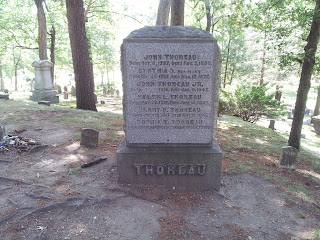 |
| Welcome Sign & Front of Orchard House |
I confess to never having taken up with the novel "Little Women." I certainly read it in school, but it didn't stick with me in a way that would motivate a re-reading, although after my tour I may pick it back up. Truthfully, I feel much the same about Hawthorne's work (he was neighbor and friend of the Alcott family to the very end.) I think at the root of it is a general dislike of reading fiction, most especially "realistic" or "historical" fiction. I can deal with fiction that is fantastical or highly imaginative, but reading fiction that basically just mirrors the human condition isn't fun for me. I'd rather go straight to the sources and read non-fiction than peer through that glass darkly.
The tour through the house was packed with non-fiction and I learned a great deal about the Alcott family that I didn't know before entering - that alone was worth the price of admission. The house is very well decorated with both original artifacts of the family as well as original art work by Louise's sister May Alcott. It's an exceptional stop for anyone visiting the Boston/Concord area.
Most curious to me was learning more about Amos Bronson Alcott, Louise's father. Bronson was part of the transcendentalist movement in Concord and close friends with both Emerson and the young Henry David Thoreau. He was mostly a failed writer and educator who chased dreams and ideas which often caused financial hardship on the Alcott family. Louise would lovingly satirize her upbringing much later in life in the book, "Transcendental Wild Oats," which would depict her head-in-the-clouds father and others as being dependent on the women in their life to float off into those heady spaces.
Make no mistake, she loved her father, but Louise May recognized the impracticality of so many philosophical musings which basically failed to put bread on the table. In fact, she was more or less forced to write to help support the family as Bronson's many failures as a provider had left them dependent on the kindness of people like Emerson.
But Bronson fascinates me in two regards - first, was his failed school in Boston, called "Temple School." Bronson's educational strategies were outrageous for the day - he believed children should not be given repetitive work without first having their minds opened. Bronson Alcott would have discussions on the Gospels and ask such questions like "Are the miracles of Jesus literal, or metaphorical?" Teaching students to question at every opportunity, questioning even the most basic "truths" of the day held in Holy Writ got him into loads of hot water. The newspaper was brimming with critics and eventually parents pulled their children out of his school, due in part to all the noise being circulated.
Second, Bronson is a fascinating figure because of the children he fathered: four girls - all of which were highly educated, culturally sensitive, artistic, and productive. He clearly employed his educational strategy at home in the way he raised his kids. Louise May was obviously the most accomplished of the four daughters, but the wealth generated from her books enabled her to get her little sister May the formal art education she'd always dreamed of & truthfully, May was an accomplished artist. Her older sister Anna had both a passion and talent for acting, and while the sister right under her age died young, she was an accomplished piano player. All four girls were strong women, abolitionists, and advocates for women's rights.
I've always believed the greatest life work anyone can leave behind are healthy, productive children. In that regard, Bronson was a huge success no matter how many of his writings failed to garner attention. Bronson also built this:
The Concord School of Philosophy was a summer school that brought in leading intellectuals of the day to teach summer courses in philosophy, art, & history. Although the school only lasted a few short years until Alcott's death, it attracted the likes of Emerson and Thoreau and often utilized a Platonic teaching method of reading and reflection. Bronson was out to change culture by opening up the mind of both young and old alike. He committed his life to this end, despite many financial hardships - quite tenacious I think despite being so "flighty."
That tenacity was an apple that obviously didn't fall too far from the tree as we see so much of it Louise May's life.
I look forward to reading "Record of School" by Elizabeth Peabody which details Bronson Alcott's teaching strategies. Oh and by the way, Elizabeth Peabody? She went on to open the first kindergarten in the United States and pioneered the way for early childhood education, using in part, Bronson's teaching styles.









